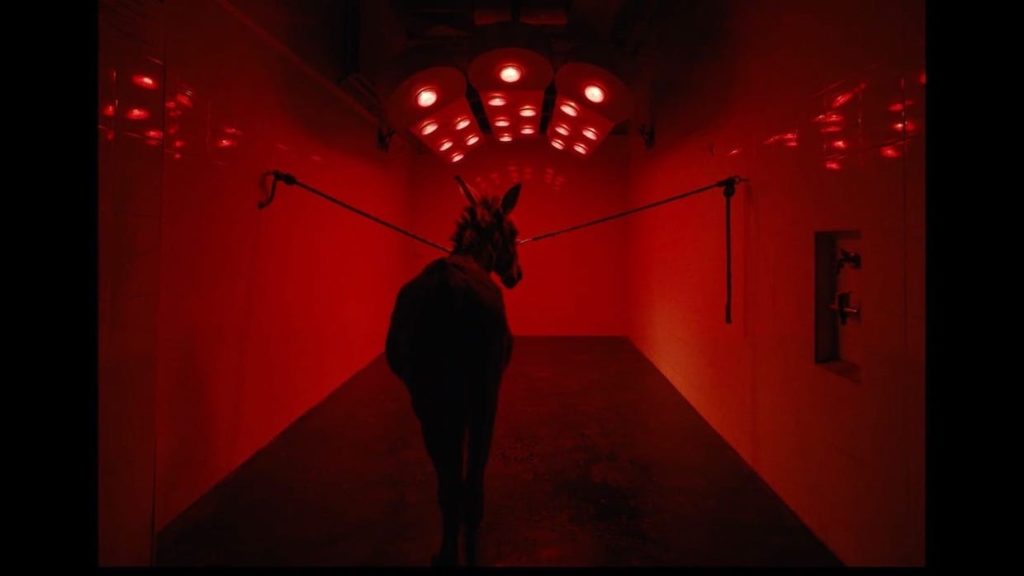Here Comes a 'Spirited' Christmas
Spirited inverts the tropes of the holiday musical genre to update an age-old tale for 2022. It's a paean to those who make grand spectacles possible.


In a cinematic day and age when homo sapiens have rinsed and reframed their own narratives ad infinitum, a non-human perspective on the human experience is a welcome change. Each person comes with their own set of preconceptions and perceptual limitations, and we can only imagine what it would be like to see the world through, say, the eyes of an orphaned circus donkey. Such is the dark delight of Jerzy Skolimowski’s EO, which tosses the human point of view aside for a much more modest and less ostentatious narrative lens. Having won the Jury Prize at Cannes, and recently named the best film of 2022 by New York Times film critic Manohla Dargis, EO is a story about a wandering donkey that is by turns comedic, painful, visually ravishing, and surprisingly human.
The film makes splendid use of the “innocent witness” device to catalogue the moral ills petty squabbles, casual violence, and domestic tragicomedies of humanity, while representing the perspective of the dispossessed and the exploited. The film’s titular protagonist, a member of a marginalized community from the get-go, devalued in comparison to his sensuously-filmed show horse relatives, plays stand-in for all creatures, human or animal, who have been relegated to the role of de facto recipients of society’s cruelty.
Utilizing the passive subjectivity of a hoofed mammal—whose expressionless and mute demeanor acts as a blank canvas upon which the viewer’s emotions are reflected—the film paints a collage of human interactions as seen through EO’s point of view. After being separated from his comfortable, if imperfect, life with a circus troupe, and the caring arms of his performance partner, Kasandra (Sandra Drzymalska), by an animal rights group who fails to see their ostensible activism to its conclusion, EO embarks on a peregrination across the Polish countryside. He is shipped from one farm to another where the working stints are short-lived.
In an apparent search for something more closely resembling a life of fulfillment (though the donkey never tells us what he is looking for), EO has a habit of ditching one situation and wandering into another. The constant question of “what else is there?” seems to loom just on the horizon, somewhere beyond the red-drenched wilderness shots of bubbling rivers and skeletal trees reminiscent of 2001’s Star Gate Sequence. The film imbues a mysteriously restless personality into EO’s itinerant nature. Skolimowski posits that even the most unassuming member of a marginalized community can view and experience the world in completely unique ways. The film imagines the subjectivity of an oft-dismissed creature that is fully capable of the indescribable yearning that afflicts much of the human population.

The scenes into which EO wanders run the gamut of human nature and the enterprises we undertake. EO is wrongfully blamed for causing a missed penalty kick during a local soccer league game, for which he is lionized by the victors, savagely beaten by the losers. He is corralled and sold for meat, saved by happenstance or sprung free in moments of minor chaos. He is valued only in so far as he is useful, with one exception; a troubled young priest picks up EO from a crime scene and takes him to a family home in Italy where, in a brief aside, we learn he is romantically involved with his stepmother (Isabelle Huppert). EO is unperturbed and uninvested in the affair. He makes a snack of the front lawn and slips out of an open gate as the transgressions take place off-screen.
In this way, EO plays the wallflower witness to the driving forces of human micro-dramas within the expanse of nature’s vast landscape. He weaves in and out of storylines that the film presents with little preface and even less conclusion. While EO’s autonomy as a member of a marginalized community is harshly mitigated by those who see fit to exert their will over his personal domain, the silent nobility of the donkey’s journey makes him an admirable and empathetic character. He doesn’t hurt anybody who doesn’t deserve it, and does what he can to take his fate into his own hands, or…hooves.
“Be like the donkey,” the film left me thinking. Be like EO, the brazen Equidae, an embodiment of the restless soul’s search for meaning, a kindred spirit unchanged by the callousness of a more developed species who weaponizes their privilege to repeatedly oppress the innocent.
Related lists created by the same author
Spirited inverts the tropes of the holiday musical genre to update an age-old tale for 2022. It's a paean to those who make grand spectacles possible.
Related diversity category
This live-action Barbie movie brings strong feminism and topics about blondes.
Related Movie / TV / List / Topic
Crazy Rich Asians. The title is tacky, but the actual movie is both heartwarming and cosmopolitan. After all, it takes place in Singapore!